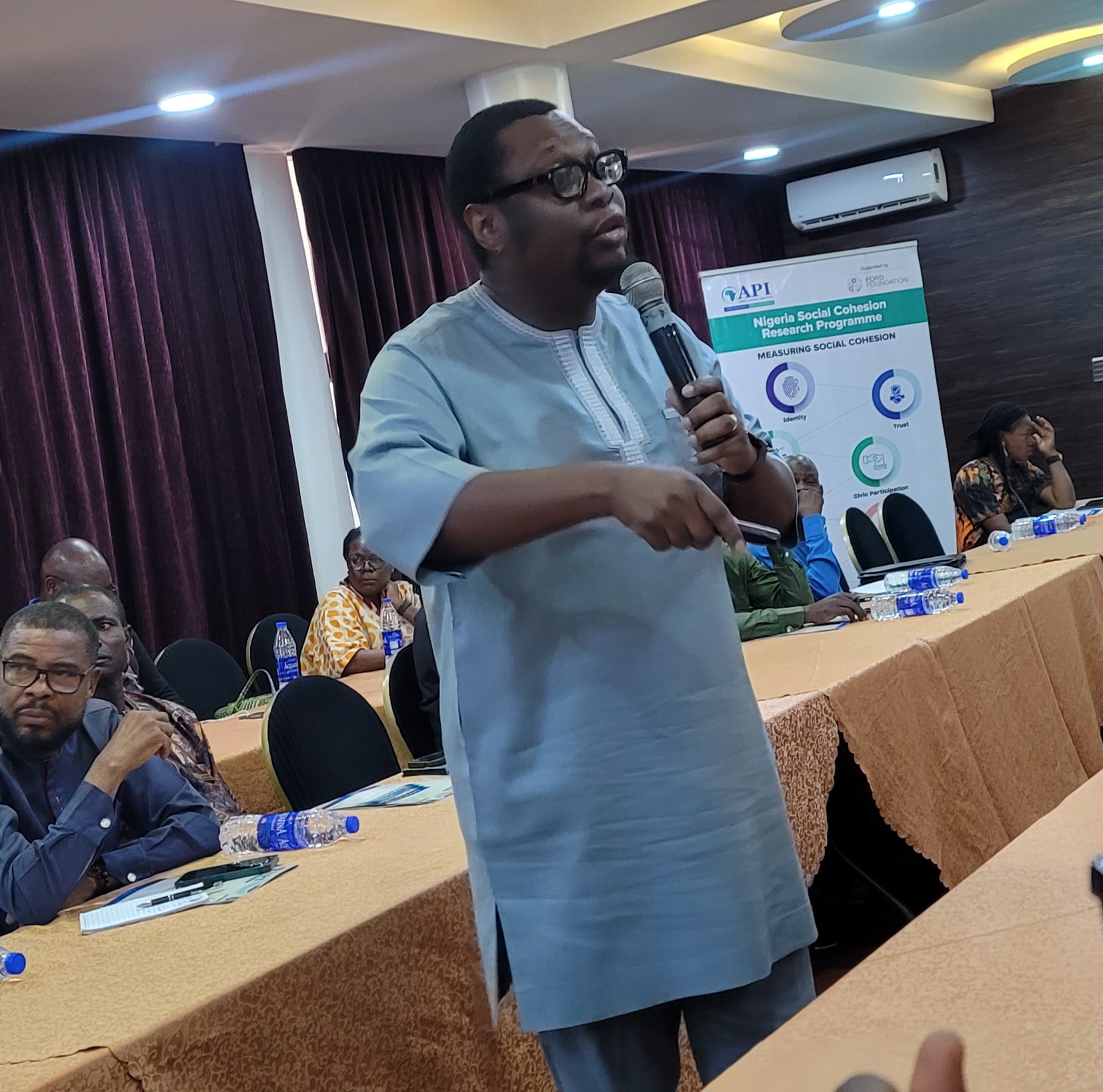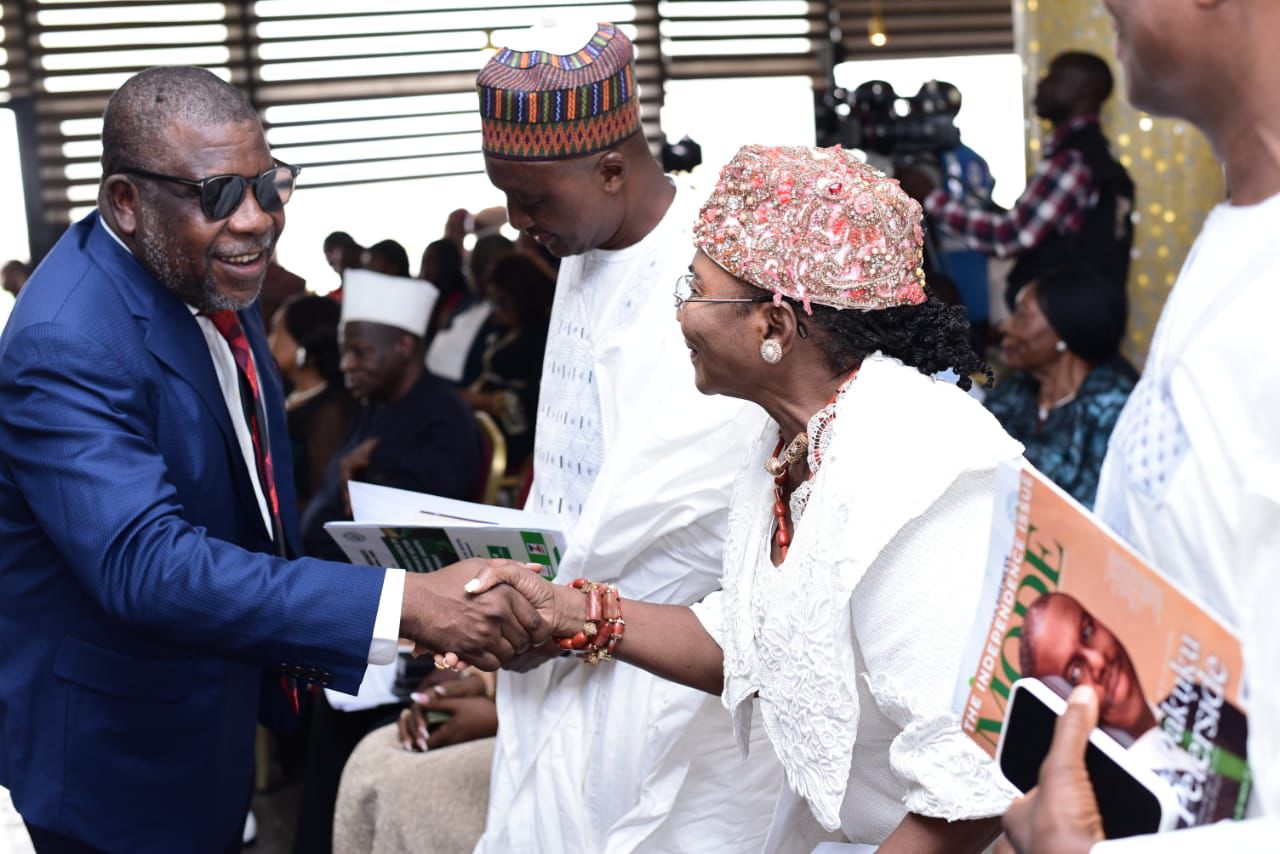News
New Social Cohesion Report for Nigeria to Be Released July 3 by API

By Joel Ajayi
The Africa Polling Institute (API) has announced the official launch of the 2025 Nigeria Social Cohesion Survey Report, scheduled for July 3, 2025. The report aims to bridge the persistent gap between data availability and its practical application in promoting national unity, peace, and long-term stability.
The Executive Director of API, Prof. Bell Ihua, made the announcement during a one-day capacity-building workshop for journalists held in Abuja, themed: “Promoting Effective Media Reportage Through the Use of Social Cohesion Data.”
The training aimed to equip journalists with the skills to interpret and apply social cohesion data in storytelling, advocacy, and peacebuilding efforts.
Prof. Ihua underscored the importance of the media in shaping public narratives that foster unity. He noted that Nigeria continues to grapple with several social cohesion challenges, including widespread distrust in government, political polarization, and limited access to justice.
“Our findings consistently show that many Nigerians believe justice is not equally accessible. The perception that only the rich and powerful can seek redress feeds into wider disillusionment with the state,” Ihua stated.
He stressed the need for a collective shift in national orientation, urging citizens to embrace a Nigerian identity above ethnic, regional, or religious affiliations.
“We must begin to see ourselves as Nigerians first. This mindset shift is critical to building bridges and strengthening cohesion,” he said.
According to Ihua, the upcoming 2025 survey will be API’s fourth national report on social cohesion. Previous editions have helped define key indicators such as unity, tolerance, trust, civic responsibility, and inclusion across Nigeria’s diverse population.
“Data is more than numbers. It reflects real-life experiences and public attitudes. Our goal is to use these insights to inform policies, support peacebuilding, and drive inclusive development,” he added.
Also speaking at the workshop, Dr. Olusoji Adeniyi, a social policy expert and lead facilitator, described social cohesion as “the strength of relationships and the sense of solidarity within a society.”
He emphasized the critical role of journalists in using data to shape national dialogue and advance democratic governance.
“Nigeria has no shortage of data. The challenge is translating that data into actionable solutions. Journalists must be equipped to connect the dots and tell stories that inspire reform,” he said.
Adeniyi highlighted that API’s surveys continue to reveal deepening divides along religious, ethnic, and political lines, with many policymakers and civic actors yet to harness these findings for effective intervention.
Odoh Okenyodo, founder of Akweya TV and media trainer, charged journalists to approach social cohesion reporting with professionalism, integrity, and a deep sense of civic duty. He noted the risks involved in reporting sensitive identity-related issues, especially in conflict-prone regions.
“The threats are real—from limited access to reliable data, to harassment and lack of institutional support—but journalists must not shy away from the responsibility of reporting the truth,” he said.
He advocated for context-driven, solution-focused journalism that avoids sensationalism and promotes narratives of unity, healing, and inclusion.
Development expert Titilope Ojo also addressed the challenges faced by media professionals working under owners who often prioritize political and economic interests over national development narratives.
“Despite these pressures, journalists must remain committed to advancing the national interest. Nationalism should be at the heart of the stories we tell,” she said.
Journalism scholar Dr. Obiora Chukwumba lamented the declining quality of journalism in Nigeria, citing poor funding and limited reach as key constraints. He called for sustainable business models, investments in investigative journalism, and capacity-building initiatives to elevate standards across the sector.
Meanwhile, Dr. Hamisu Muhammad, Head of Mass Communication at Baze University, delivered a keynote lecture on the complex interplay between identity, nationalism, and media narratives. He attributed Nigeria’s sociopolitical fragmentation to the rise of micro-nationalism—a trend where ethnic and regional loyalties are placed above national identity.
> “Media can either unite or divide us. It all depends on the values we choose to uphold in our editorial decisions,” he said.
Dr. Muhammad concluded by calling for a more inclusive, balanced media approach that respects Nigeria’s diversity but works actively to bridge existing divides.
As API prepares to unveil its 2025 Social Cohesion Survey Report, stakeholders expressed hope that the data will not only inform government policy but also empower journalists and civic actors to tell stories that build trust, promote justice, and inspire national progress.
The workshop ended with a collective call for greater collaboration among media practitioners, researchers, and civil society to transform social cohesion data into a practical tool for peace, equity, and inclusive nation-building.
News
AUDA-NEPAD CEO Highlights Collaboration as Catalyst for Africa’s Economic Competitiveness

Joel Ajayi
The Chief Executive Officer and National Coordinator of AUDA-NEPAD Nigeria, Hon. Jabiru Salisu Abdullahi, has called for stronger public-private partnerships to boost Africa’s global competitiveness.
Speaking at the High-Level Business Forum 2025 organised by the NEPAD Business Group Nigeria in Lagos, Hon. Abdullahi said Africa’s transformation will be driven by enterprise, not aid.
He urged governments to create enabling environments that foster innovation, industrial growth, and sustainable development.
He reaffirmed AUDA-NEPAD Nigeria’s commitment to working with private sector actors and development partners to deliver key initiatives in agriculture, ICT, manufacturing, and renewable energy under the AU Agenda 2063 framework.
The event brought together top business and policy leaders, including representatives from the African Business Roundtable, the Bank of Industry, the Africa Finance Corporation, and the Manufacturers Association of Nigeria, among others.
-

 Featured6 years ago
Featured6 years agoLampard Names New Chelsea Manager
-

 Featured6 years ago
Featured6 years agoFG To Extends Lockdown In FCT, Lagos Ogun states For 7days
-

 Featured6 years ago
Featured6 years agoChildren Custody: Court Adjourns Mike Ezuruonye, Wife’s Case To April 7
-

 Featured6 years ago
Featured6 years agoNYSC Dismisses Report Of DG’s Plan To Islamize Benue Orientation Camp
-

 Featured4 years ago
Featured4 years agoTransfer Saga: How Mikel Obi Refused to compensate me After I Linked Him Worth $4m Deal In Kuwait SC – Okafor
-
Sports3 years ago
TINUBU LAMBAST DELE MOMODU
-

 News10 months ago
News10 months agoZulu to Super Eagles B team, President Tinubu is happy with you
-
Featured6 years ago
Board urges FG to establish one-stop rehabilitation centres in 6 geopolitical zones
